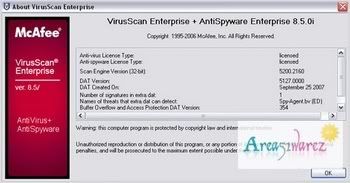McAfee Virus SuperDAT Definitions Update 5180- December
08 December 2007

McAfee Virus Definitions description:
McAfee virus pattern and engine updates:
Virus definition, or .DAT, files contain up-to-date virus signatures and other information that Network Associates anti-virus products use to protect your computer against the thousands of computer viruses in circulation.
Virus definition, or .DAT, files contain up-to-date virus signatures and other information that Network Associates anti-virus products use to protect your computer against the thousands of computer viruses in circulation.
Whether it's VirusScan, VirusScan Pro or Internet Security Suite, make sure you have the very latest Internet protection.
Network Associates releases new .DAT files regularly to provide protection against the approximately 300 new viruses that appear each month.
To ensure that your anti-virus software can protect your system or network against the latest virus threats, download and install
the latest .DAT files.
the latest .DAT files.
The DAT files are compatible with our anti-virus products (McAfee) that use the version 4.3.20 (or later) virus-scanning engine. We recommend that you upgrade to the latest version of the virus-scanning engine for optimal virus detection and cleaning.















Leave your response